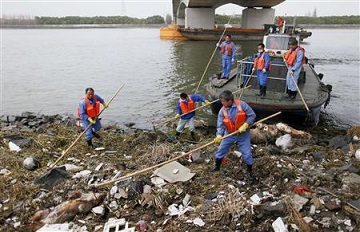Dead pigs in China river spotlight heedless industry
 The rotting bodies of about 6,000 pigs in a river that supplies tap water to Shanghai has drawn attention to an ugly truth - China’s pig farms are often riddled with disease and one way or another, sick animals often end up in the food chain.
The rotting bodies of about 6,000 pigs in a river that supplies tap water to Shanghai has drawn attention to an ugly truth - China’s pig farms are often riddled with disease and one way or another, sick animals often end up in the food chain.Authorities have found traces of a common pig virus in some of the animals floating in the Huangpu River this week, and industry insiders say farmers likely dumped them, common in an industry which has no system of compensation for losses from disease.
“There is no mechanism by which, whenever diseases are found among pigs, the government compensates pig breeders so as to control the spread of diseases or compensate pig breeders for losses,” said Feng Yonghui, general manager at pig-industry research organization Soozhu.com.
To make matters worse, Feng said insurance companies were unwilling to insure pig breeders because the risks were so high.
On Wednesday, workers on barges and on the riverbank used pitchforks to drag bloated dead pigs out of the river.
Pork is China’s staple meat and the swine population is the world’s largest at 475 million head at the end of last year.
At market, margins on pork are thin and for hog farmers unwilling to spend money to incinerate or bury dead animals, the Huangpu River may have offered a tempting alternative.
While there was no proof any sick animals had been butchered and sold for meat in this case, media have reported several scandals involving sick or dead livestock being butchered and sold for meat.
Early this year, state media accused a supplier of chicken to KFC and McDonald’s of selling them sick poultry. The supplier denied it.
While authorities have not confirmed a disease, or the death of unusually large numbers of pigs, talk of pigs dying would seem to suggest an outbreak of some sort.
One Jiaxing farmer, 69-year-old Jiang Lie, said about 30 percent of his pigs had died of disease since January.
Reuters witnesses visited three reeking swine disposal pits in Jiaxing which appeared to have been just filled up and had signs saying they were at capacity.
“TOUGH JOB”
Dumping pigs into a river is not unheard of.
“We don’t think it is individual case. Many similar cases were just not reported,” said Wang Xiaoyue, an analyst with Beijing Orient Agri-business Consultant Co Ltd.
Villager Yan Lan’e said there were always pigs in the Huangpu, and aside from the number, the only difference this week was that authorities were clearing them out along with the trash.
“Before, they just cleared out the garbage,” she said.
Rather than blaming the farmers, Lin Rongquan, a veterinary health expert in Shanghai, pointed the finger of blame at the local government, a major link in the chain of agencies overseeing farms.
“It’s definitely the problem of the local government, which should bear the main responsibility. They do not regulate the pig business well,” he said.
On Sunday, the central government unveiled restructuring plans aimed at improving efficiency and cutting out graft. The changes came as parliament sat in Beijing for a session at which complaints of corruption and red tape were common.
The restructuring included bundling the responsibilities of several agencies into a ministerial-level General Administration of Food and Drug in response to the scandals.
Analyst Wang said that should help but it would not change things overnight given the problems from feed additives, the use of antibiotics and pollution.
“It’s a tough job to improve things,” he said.
Many people took to the internet to complain. Others sought solace in grim humor.
In one joke posted online, a Beijing resident boasts about the air pollution in the capital, saying if he wanted a smoke, he just had to open the window.
A Shanghai resident retorts: “That’s nothing, when we turn on the tap, we get free rib soup.”
You can return to the main Market News page, or press the Back button on your browser.

